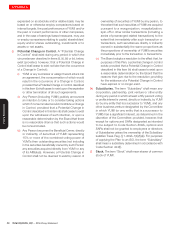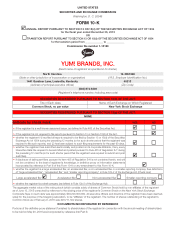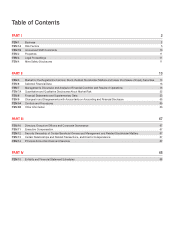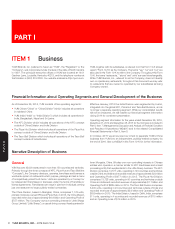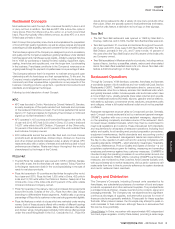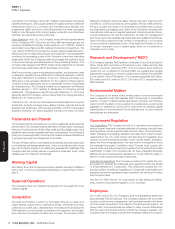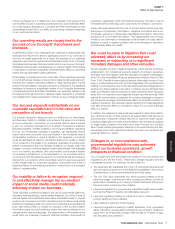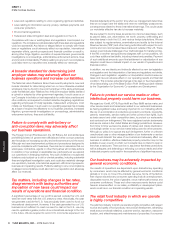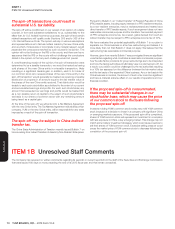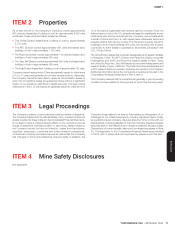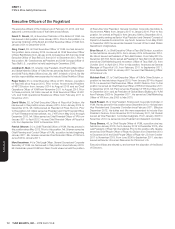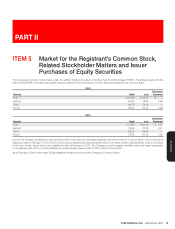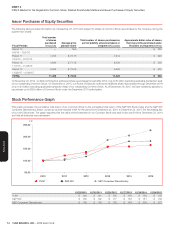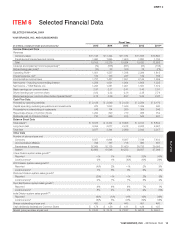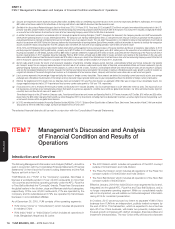Pizza Hut 2015 Annual Report Download - page 115
Download and view the complete annual report
Please find page 115 of the 2015 Pizza Hut annual report below. You can navigate through the pages in the report by either clicking on the pages listed below, or by using the keyword search tool below to find specific information within the annual report.
YUM! BRANDS, INC.-2015 Form10-K 7
Form 10-K
PART I
ITEM 1ARisk Factors
of fuel surcharges by our distributors. Any increase in the prices of the
commodities we use or operating expenses we incur could adversely affect
our profit margins. Because our Concepts and their franchisees provide
competitively priced food, our ability to pass along increased expenses
to our customers is limited.
Our operating results are closely tied to the
success of our Concepts’ franchisees and
licensees.
A significant portion of our restaurants are operated by franchisees and
licensees from whom we derive a significant portion of our revenues in
the form of royalty payments. As a result, the success of our business
depends in part upon the operational and financial success of our Concepts’
franchisees and licensees. We have limited control over how our Concepts’
franchisees’ and licensees’ businesses are run, and the inability of franchisees
or licensees to operate successfully could adversely affect our operating
results through decreased royalty payments.
If franchisees or licensees incur too much debt, if their operating expenses
or commodity prices increase or if economic or sales trends deteriorate such
that they are unable to operate profitably or repay existing debt, it could
result in financial distress, including insolvency or bankruptcy. If a significant
franchisee or licensee or a significant number of our Concepts’ franchisees
or licensees become financially distressed, our operating results could
be impacted through reduced or delayed royalty payments or increased
rent obligations for leased properties on which we are contingently liable.
Our success depends substantially on our
corporate reputation and on the value and
perception of our brands.
Our success depends in large part upon our ability and our franchisees’
and licensees’ ability to maintain and enhance the value of our brands
and our customers’ connection to our brands. Brand value is based
in part on consumer perceptions on a variety of subjective qualities.
Business incidents, whether isolated or recurring and whether originating
from us, our franchisees, licensees or suppliers, can significantly reduce
brand value and consumer trust, particularly if the incidents receive
considerable publicity or result in litigation. For example, our brands
could be damaged by claims or perceptions about the quality or safety
of our products or the quality of our suppliers, regardless of whether such
claims or perceptions are true. Similarly, entities in our supply chain may
engage in conduct, including alleged human rights abuses, that damages
our or our brands’ reputations. Any such incident could cause a decline
in consumer confidence in, or the perception of, our Concepts and/or
our products and decrease the value of our brands as well as consumer
demand for our products, which would likely result in lower revenues and
profits. Additionally, our corporate reputation could suffer from a real or
perceived failure of corporate governance or misconduct by a company
officer or representative.
Our inability or failure to recognize, respond
to and effectively manage the accelerated
impact of social media could materially
adversely impact our business.
There has been a marked increase in the use of social media platforms,
including weblogs (blogs), social media websites, and other forms of
Internet-based communications which allow individuals access to a broad
audience of consumers and other interested persons. Many social media
platforms immediately publish the content their subscribers and participants
post, often without filters or checks on accuracy of the content posted.
Information posted on such platforms at any time may be adverse to our
interests and/or may be inaccurate. The dissemination of information online
could harm our business, prospects, financial condition, and results of
operations, regardless of the information’s accuracy. The harm may be
immediate without affording us an opportunity for redress or correction.
Other risks associated with the use of social media include improper
disclosure of proprietary information, negative comments about our
Concepts, exposure of personally identifiable information, fraud and
disclosure of out-of-date information. The inappropriate use of social
media by our customers or employees could increase our costs, lead to
litigation or result in negative publicity that could damage our reputation
and adversely affect our results.
We could be party to litigation that could
adversely affect us by increasing our
expenses or subjecting us to significant
monetary damages and other remedies.
We are regularly involved in legal proceedings, which include consumer,
employment, tort, intellectual property, breach of contract, securities,
derivative and other litigation (see the discussion of Legal Proceedings in
Note 18 to the consolidated financial statements included in Item 8 of this
Form 10-K). Plaintiffs in these types of lawsuits often seek recovery of very
large or indeterminate amounts, and the magnitude of the potential loss
relating to such lawsuits may not be accurately estimated. Regardless of
whether any claims against us are valid, or whether we are ultimately held
liable, such litigation may be expensive to defend and may divert resources
away from our operations and negatively impact reported earnings. With
respect to insured claims, a judgment for monetary damages in excess of
any insurance coverage could adversely affect our financial condition or
results of operations. Any adverse publicity resulting from these allegations
may also adversely affect our reputation, which in turn could adversely
affect our results.
In addition, the restaurant industry has been subject to claims that relate to
the nutritional content of food products, as well as claims that the menus
and practices of restaurant chains have led to customer health issues,
including weight gain and other adverse effects. We may also be subject
to these types of claims in the future and, even if we are not, publicity
about these matters (particularly directed at the quick service and fast-
casual segments of the retail food industry) may harm our reputation and
adversely affect our results.
Changes in, or noncompliance with,
governmental regulations may adversely
affect our business operations, growth
prospects or financial condition.
Our Concepts and their franchisees are subject to numerous laws and
regulations around the world. These laws change regularly and are
increasingly complex. For example, we are subject to:
•
The Americans with Disabilities Act in the U.S. and similar state laws that
give civil rights protections to individuals with disabilities in the context
of employment, public accommodations and other areas.
•
The U.S. Fair Labor Standards Act, which governs matters such as
minimum wages, overtime and other working conditions, as well as
family leave mandates and a variety of similar state laws that govern
these and other employment law matters.
•
Laws and regulations in government-mandated health care benefits
such as the Patient Protection and Affordable Care Act.
•
Laws and regulations relating to nutritional content, nutritional labeling,
product safety and menu labeling.
•Laws relating to state and local licensing.
•
Laws and regulations relating to health, sanitation, food, workplace
safety, child labor, including laws prohibiting the use of certain “hazardous
equipment” by employees younger than the age of 18 years of age,
and fire safety and prevention.



